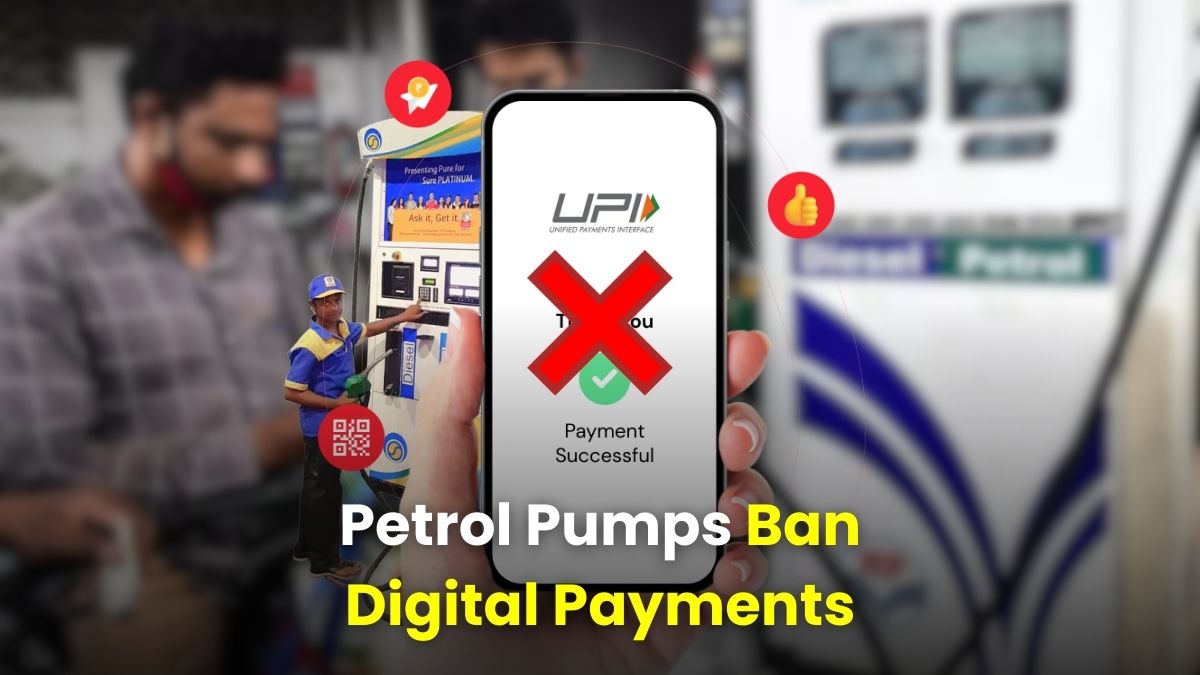Digital Payment Ban – If you’re living in Nagpur and are used to paying for petrol with your phone or card, it’s time to go back to the old ways. Starting May 10, 2025, most petrol pumps in the city will no longer accept digital payments like UPI, QR codes, or mobile wallets. Instead, customers will have to pay in cash.
This change isn’t just a random decision. The Vidarbha Petroleum Dealers Association, which represents petrol pump operators in Nagpur and surrounding areas, has made this call due to increasing cases of cyber fraud targeting fuel stations. While the move is temporary, it’s bound to create inconvenience for thousands of people who’ve become reliant on digital transactions for their day-to-day fuel needs.
Why Was This Decision Made?
According to the association, the ban on digital payments comes after a sharp increase in cyber fraud incidents. In one particular case, a cybercriminal carried out fraudulent transactions using the digital payment system at a local petrol pump. When the victim reported the incident to the National Cyber Crime Portal, it led to the immediate freezing of the pump owner’s bank account. As a result, the petrol pump operator was suddenly unable to access their funds—even though they had done nothing wrong.
Since that case, two dealers have had their accounts fully frozen, and over 30 other dealers have had “lien marks” placed on their bank accounts, preventing them from using the money. In one particularly frustrating example, a pump owner had their account blocked over a mere transaction of around 280 rupees, even though the account contained more than 18 lakh rupees.
Dealers say these kinds of issues have become more common and are seriously impacting their ability to operate. With frozen accounts, they can’t pay their suppliers, staff, or meet daily operational expenses.
Major Disruption in Everyday Life
For citizens, especially those who’ve grown used to quick and convenient UPI payments, this move is going to feel like a big step backward. Now, people will have to carry cash every time they go to fill up their vehicles.
This is not just about slight inconvenience. For many, digital payments have become a lifestyle—offering speed, traceability, and security. Banning digital transactions, even temporarily, disrupts that rhythm. It’s particularly troublesome for younger consumers and working professionals who may not be in the habit of carrying cash.
A Setback for Digital India
The Indian government has long been pushing for a digital revolution, promoting initiatives like Digital India and cashless transactions. With this background, the Nagpur decision feels like a contradiction. It sends a message that the digital infrastructure still has major gaps—especially in areas of security and redressal mechanisms.
Even though the intention behind the decision is to protect pump operators from fraud, it also exposes a loophole in how digital fraud cases are handled. In current practice, when someone files a fraud complaint, the authorities freeze the account where the money was last deposited—often without fully investigating the situation. This automatic action causes serious trouble for innocent businesses.
Understanding How These Frauds Happen
Petrol pump owners explain that these frauds often involve customers pretending to pay through digital platforms. The fraudsters use screenshots or generate fake confirmation messages to trick the staff into believing that the payment has gone through. When the actual victim of the fraud raises a complaint, the last bank account that received the money is flagged—usually the pump operator’s account.
What’s even more worrying is that once an account is frozen, it takes a lot of time and paperwork to get it unblocked. And during that time, the business suffers.
What the Dealers’ Association Is Saying
Amit Gupta, the president of the Vidarbha Petroleum Dealers Association, says this measure was necessary. He clarified that unless a permanent solution is found to safeguard the interests of dealers, digital payments will remain suspended. “Until the banking system and cyber crime portal offer a more balanced and fair way of handling fraud complaints, we cannot risk losing our hard-earned money,” he stated.
Impact on Citizens and the Road Ahead
So, what should citizens expect? Well, simply put, they’ll need to start carrying cash for their fuel purchases in Nagpur. Those who rely on Google Pay, Paytm, PhonePe, or card swipes will need to adjust their routines.
Although this ban is limited to Nagpur (for now), it could set a precedent for other cities if similar frauds continue. It also raises important questions about how India handles the balance between encouraging digital growth and protecting businesses from its risks.
For now, residents should plan ahead, keep some cash handy, and hope that a safer, smarter payment system is introduced soon—one that works for both customers and business owners alike.





